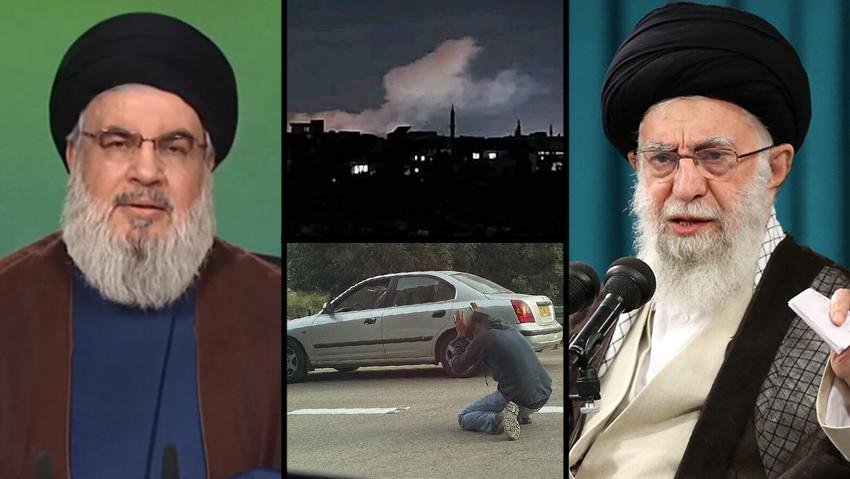
Iran and Hezbollah’s new terror venture in Syria
After three strikes in Syria, attributed to Israel, a hostile aircraft was shot down over the Galilee on Sunday and those events seem to be connected.
One of the Iranian military advisors who were killed in a strike on the Damascus area late on Thursday was most probably connected to the intruding UAV.
The strike on Saturday, on the airport at al Dabaa was aimed at destroying the Iran-backed Hezbollah group’s drone capability and the logistic and training facilities there and hitting the Iranian drone operators deployed to assist the Islamist group. It might also have been retaliation over Hezbollah’s role in the terror attack at Megiddo last month when an explosive device placed on a main highway seriously injured one man.
Israeli security officials have been warning repeatedly of late, that Iran, Hezbollah and the Hamas terror group were increasingly attempting to incite violence in the West Bank and motivate Palestinians there to launch attacks against IDF troops and settlers.
Some of those efforts included Iranian funding, arming and instruction while sometimes the efforts originate with Lebanon’s Hezbollah. A senior Hamas official in Lebanon has been participating in such initiatives, hoping to cause a wave of terror attacks during the holy month of Ramadan.
Hence the concern after the use of an IED of the type often used by Hezbollah and the Iranian Revolutionary Guard Corps, (IRGC) in Megiddo, placed by a Lebanese man of Palestinian origin. To add to the mess, a small Palestinian group calling themselves the Wolves of Galilee claimed they had dispatched the terrorists.
In the immediate aftermath of that attack, Israel appeared unconvinced and as the investigation intensified, the suspicion that Hezbollah was responsible grew. According to the location of the explosive device, IDF forces heading to the Jenin refugee camp may have been the target.
Pundits in the Israeli media have said Israel would not be able to ignore such a violation of its sovereign territory, but it was also clear that any Israeli military response would have to take the existing deterrence between the IDF and Hezbollah into account.
The rules were set by Hassan Nasrallah when he announced that every member of his organization that would be targeted and any violation of Lebanese territory by the IDF would be met with a “destructive response.”
It is clear that would mean a rocket attack or one by a drone which Hezbollah has in the tens of thousands. Israel has shown several times in the past, that it is mindful of the red lines set by the Hezbollah leader, so as not to get entangled in an altercation that would result in civilian casualties and the disruption of life in the north. However, the military does respond with measured and secret attacks when rockets are launched from Lebanon or other attempts to cause harm, are made in the area of the Shebaa Farms, where Israel, Lebanon and Syria meet.
If Israel is behind the attacks in Syria in recent days, the targets would be military instillation in the service on Iran and joint Iranian-Hezbollah infrastructure to instigate terror attacks in Israel and on the West Bank that would add to the chaos already spreading in Israel in the wake of the coalition’s rush to legislate a judicial overhaul.
The latest efforts seek to increase Israeli distrust in the government by choosing to attack inside Israel, in retaliation for alleged Mossad killings inside Iran.
The alleged Israeli attacks in Syria are a way to impact an important Hezbollah asset outside Lebanon itself and avoid escalation across the Israel-Lebanon frontier.
The Iranian “advisors” who were killed in the strikes last week, were deployed there to assist Hezbollah and other pro-Iran militias in their terror initiatives but the next attack on Saturday, was a more devastating blow to an important logistic facility on the road between Syria and the Lebanese Beqaa Valley.
According to international press reports, the airport houses Hezbollah training facilities, large weapons system stores and an experimental drone production site.
There are only 15 kilometers (9 miles) between the Dabaa airport, formerly a major Syrian military base, and the border with Lebanon, making it an important strategic asset for Hezbollah. If the Islamist terror group is responsible for dispatching a terrorist into Israel, attacking the airport could be seen as a direct Israeli response, which would be in line with the rules of the game.
Israel has not claimed responsibility for the attacks but has operated wisely to cause damage without giving Hezbollah an excuse to use its arsenal of rockets and missiles against Israelis during the volatile holiday season.
Source » ynetnews





